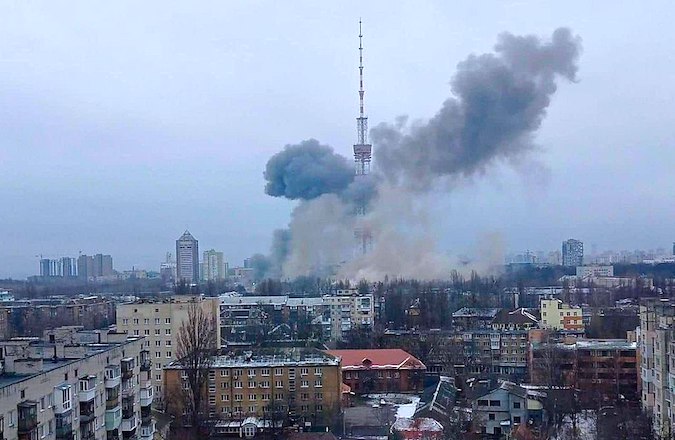The first ever recorded war to be documented was 2500 BC. It was reported and discovered on a Sumerian stone carving. Undoubtably, there would have been conflict and war prior to this, but these predate the ability to write.
A lot of things have an impact on the environment around us and we have seen, especially recently, with the war between Russia and Ukraine, that war has a devastating effect on the environment. Other factors can impact the environment, such as natural disasters. “The difference between natural disasters and war is one of intent.” [1]
 Figure 1: Russian bombardment of telecommunications antennas in Kiev. [2]
Figure 1: Russian bombardment of telecommunications antennas in Kiev. [2]
How War Evolved Over Time
One of the biggest changes to the logistics of war and the way that they play out, between 2500 BC and now, is that as humans have slowly developed in complexity, progression of weapons from clubs and spears to swords and bows, over time became guns, explosives, chemicals (such as nerve gas, cyanide chloride, hydrogen cyanide to name a few), biological weapons (such as bacteria, viruses, fungi, toxins) and nuclear weapons have damaged the ecosystems, and the environment. When animals and their habitats are destroyed, it reduces the biodiversity within that area and the whole ecosystem can fall apart. Animals and ecosystems play a huge part in restoring the planet and its climate, without nature the world would become inhabitable.
This current war between Russia and Ukraine has the capacity to release vast amounts of climate change-inducing toxic gases into the atmosphere. That is without including the countless fires as a result of explosions or fires being started purposely. Fire releases carbon dioxide and other potent greenhouse gases (such as methane and nitrous oxide) into the atmosphere when fire burns. Trees and vegetation absorb carbon dioxide during photosynthesis and store it, However, when trees and vegetation are being burnt, they release the carbon dioxide back into the atmosphere, further increasing the greenhouse gases being pumped into the atmosphere. To find out more on this topic, read our article on “Ukraine Connected to European Electricity Grid”.
What Can We Do To Preserve Our Environment?
Most things in nature, from animals to plants, can adapt to their surroundings and we have seen nature fight back in the face of adversity. For this to continue to happen, we all need to change our ways. If we all thought about ways that we could be a little bit greener, we can all work together to save ourselves and the planet. Some things may be out of most of our control, like war, but if we can all advocate for a kinder future, caring for not only each other, but the planet that we live on as well, then we could be going into a greener, healthier world with sustainable, renewable energy, safer, biodiverse ecosystems and humans living harmoniously with nature/wildlife.
About Pager Power
Pager Power undertakes technical assessments for developers of renewable energy projects and tall buildings. For more information about what we do, please get in touch.
References
[1] V. RAMANA DHARA – 01/03/2022. The Environmental Consequences of War. Accessed on 07th April 2022. Available at: The Environmental Consequences of War – The Wire Science
[2] Photograph of Ukraine (01/03/2022) Russian bombardment of telecommunications antennas in Kiev. Photo Credit: Ministry of Internal Affairs of Ukraine. Available at: File:Russian bombardment of telecommunications antennas in Kiev.jpg – Wikimedia Commons Accessed on 08th April 2022



